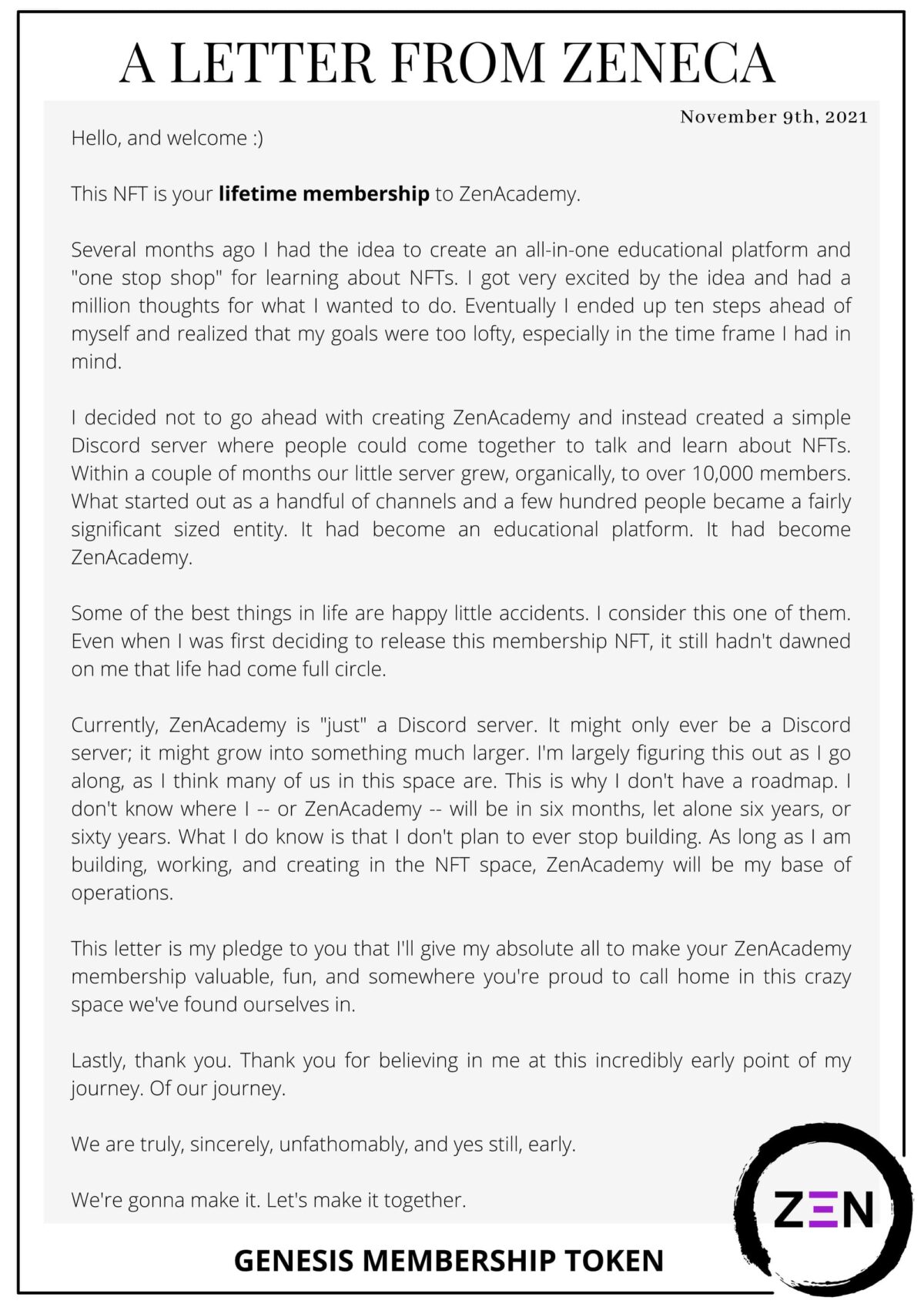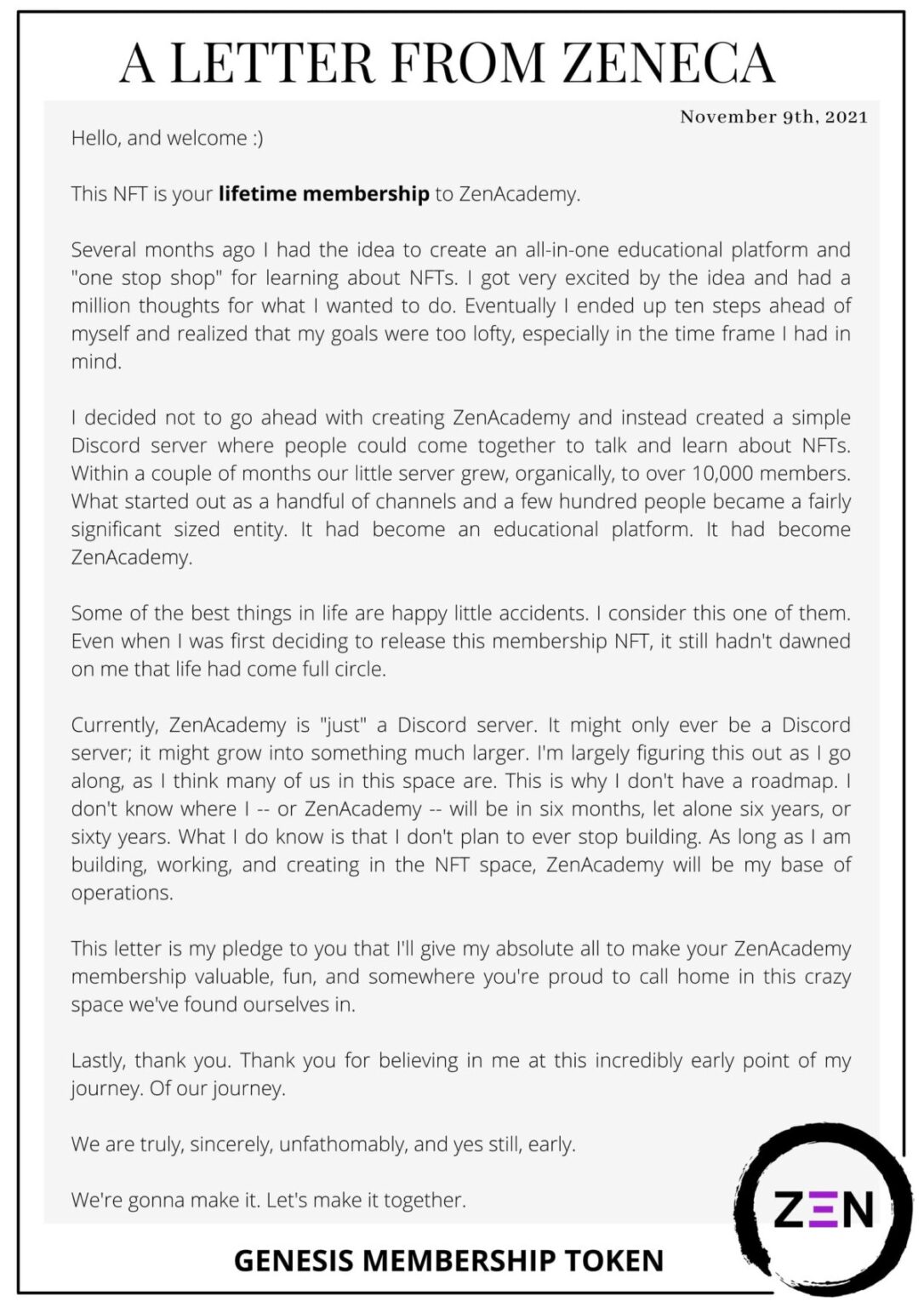Everyone remembers the person who introduced them to Web3.
Web3 builder and consultant Zeneca has filled that role for many newcomers to the space, offering a wide variety of educational offerings through its flagship ZenAcademy and more intimate 333 Club communities.
Today (August 30) Zeneca took the next step in the development of its ecosystem through the Denizens of ZenAcademy drop. After resisting the temptation to release a PFP project for nearly two years, he finally decided to take the plunge through a non-dilutive token exchange for existing community members.
“What changed for me was that now we have a community; we already have that basis,” he explains. “We have people who are excited about this PFP and want to represent the community on social media, Discord, and build the brand with us. Through that lens, it made sense to strengthen and expand our existing community, rather than using it to fund and build a community.”
In a candid nft now podcast interview, Zeneca delves into his Denizens project, offers valuable advice for content creators and community builders, and gives his unvarnished opinion on the current market.
Matt Medved: Let’s hear the backstory. How did you end up at Web3?
Zeneca: I was a professional poker player for 15 years. That’s all I did. I went from high school to poker. And then in 2017 I got into crypto, like a lot of people, but it was really like I just had my money on exchanges. I was trading, and it’s nice when the number goes up, and then [the market] crashed. And I thought, ah, that was a fun experiment, and let’s get back to real life.
But at the beginning of 2021, the bull market clearly picked up again. And I came back and some friends told me about crypto and DeFi. And I was like, there are things you can actually do on Ethereum right now, there are applications, and it really blew my mind. I saw it and asked, “Why isn’t everyone in the world talking about this?” Then I just fell down the rabbit hole, and honestly I’m still falling and just became obsessed.

You launched the Zen Academy in November 2021. For those who may not be familiar, what is the Zen Academy and what was your vision behind its creation?
In 2021 I was trading a lot. But in mid-June I started creating content. Writing newsletters, long Twitter threads, and it all exploded. And I think a big part of that was clearly the bull market: the right place, the right time. And very few other people made NFT content.
Then it all started blowing up, and I realized, ‘Hey, I love this. I enjoy creating content. I like writing. I like parenting. It’s satisfying. It is worth it. Wow, can I do this full time? I don’t want to trade anymore. I don’t want to go back to poker. And then you think about the traditional monetization models as a content creator and writer; there are Patreon, sponsors and affiliate links.”
And I thought, you know what? I’m all about NFTs. I will sell an NFT that acts as a membership token, and that will be it. We will have royalties forever, and everyone will be happy, and it will work. It didn’t quite work out that way, of course, but it was an experiment and I said, ‘You know what? This is what I want to do.”
[My token] was relatively affordable at the time. A few thousand people have hit it, and we’ve spent the last two years figuring it out, creating courses, putting out newsletters, and generally trying to educate people. That is the whole thesis of our community. I mean, it’s in the name “Academy.” It’s all about creating educational content and helping.
Let’s dive into Denizens. This is your first PFP project. What is it, and why now?
“Why PFPs?” is a good question that everyone should answer before launching a collection. Even in 2021, let alone now.
When I first launched Zen Academy I was very conscious of not doing PFPs. Because everyone did at the time. This was the peak bull in November 2021. At the time I felt there were way too many PFPs. We don’t need a new PFP project. It is clear that a billion more have come out since then and now.
What changed for me was that now we have a community; we already have that foundation. We have people who are excited about this PFP and want to represent the community on social media, Discord, and build the brand with us. Through that lens, it made sense to strengthen and improve our existing community, rather than using it to fund and build a community. We don’t sell it. We do not do public sales. We no longer earn money, perhaps to our disadvantage. Burn your previous token and receive a PFP. That’s the mechanism; it is not diluted. It has arrived well in our community.
“’Why PFPs?’ is a good question that everyone should answer before launching a collection. Even in 2021, let alone now.”
zeneca
How will the Denizens play a role in the overall ecosystem of Zen Academy, 333, etc?
Yes, so basically we are a three level membership community. So I would say 333 is the highest premium maximum of 333 tokens. Residents are like the middle tier of 10,000 PFPs. They’re like Zen Academy members: they get the same benefit they’ve always had and will continue to do in the future, which is access to courses. I create discounts for things, newsletters, free educational materials that the general public would otherwise pay for, and stuff like that. That’s our way of delivering tangible value and usability.
Instead of paying $200 or $300 for a 15 hour video course, you can buy our token and get a free course and stuff. And then we have the more accessible, inclusive level. We have the student IDs, which are the Soul Bound Unlimited stock of NFTs that anyone can now go to a website and use. This is how you end up in our ecosystem. It puts you in a Discord, and you know, you can join our mailing list, and you’re still a big part of the family, and you don’t have to, you know, spend a few ETH for a 333 pass.
Many people compare these markets to a casino; you were a poker player before you came to Web3. I’m curious: How did that experience give you insight into navigating this space?
It really looks like a casino. Most people in space gamble in one way or another. I see people all the time who clearly have gambling problems. Maybe they don’t consider it that way because it’s crypto or NFTs and not the casino or the lottery. But my background has prepared me immensely for this space, having made and lost a lot of money in a short amount of time over 15 years.
Mentally, I’ve found ways to deal with those fluctuations and not take them too seriously. As well as putting together strategies for not doing crazy things, not succumbing to addiction, not chasing my losses, and all that stuff. For people from a more traditional background or even 18 year olds who don’t have that much life experience, it’s so easy to get off track in this space. I really don’t encourage too many people to come in and splash around with money.
“The most important thing for me is to survive, not lose all your money, leave the room, give it up completely and stay mentally healthy.”
zeneca
What tips do you have for Web3 content creators?
It’s a new era. The world around us is changing and it is a matter of keeping up or, to some extent, lagging behind. There are two different schools of thought. You have the people who view audience building and content creation as a skill that you can get better at with tools, strategies and tactics like how you structure your discussions, writing a hook to get people to read the next, bookmark, retweet, and go to your newsletter. In the other camp, you have the more authentic and organic makers, where you need to find your own voice and deliver value. Some people just want to hear the raw, honest truth from someone with experience setting up a project.
Regardless of your path, it’s going to be increasingly important to be sincere and find your voice because the space has grown and there are ten times as many content creators now, so a lot of it is just the same stuff being reused. Do you really stand out? I tried the first way, enrolled in courses and created a systematic approach, but it wasn’t for me. So I’m returning to what I’ve always done, hoping it will be more sustainable in the long run. Don’t lose yourself in the process.
How do you feel about where we are in the current market cycle? Where is it going and how will NFTs play a role in the future?
I have no idea where we are in the market cycle. Looking back at four-year cycles and all that stuff, maybe things will change in 2024-2025, and then the bull will come. Results achieved in the past are no guarantee for the future. It’s like, who knows if it will turn out like this. The most important thing for me is to survive, not lose all your money, leave the room, give it up completely and stay mentally healthy.
For most people, that’s not a trade. That’s not trying to play with fire in this market. Spend some time meeting people, connecting, learning about the technology and what’s to come. If it looks like things are picking up again, you might be able to get a little more interested and invested and take advantage of that if that’s your goal.
What else can you tell us about the future plan?S?
Denizen is the big one coming out. The way to get one is, again, just for our existing community, with no public launch. You need to buy a token on a secondary market. There will be a direct one-on-one burn, grab a chest, burn and get a Denizen. What’s coming in the future is more courses and more content. I am doing a personal branding course. I think that’s something a lot of people want. We are in the world of the creative economy and building a personal brand can be valuable.
This interview transcript has been edited for brevity and clarity.
Watch or listen to our podcast episode with Zeneca for the full and uncut interview.



 (@Zeneca)
(@Zeneca) 
